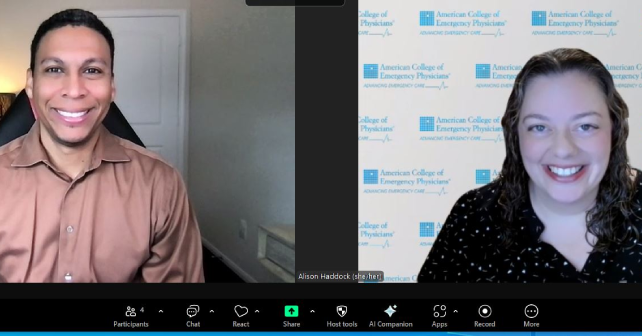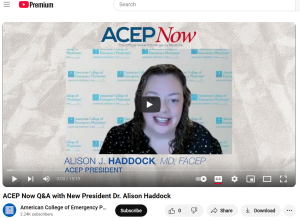
Twice a year, the Medical Editor-in-Chief of ACEP Now sits down with the ACEP President to discuss issues relevant to the College and important to emergency physicians. The questions asked are based on feedback from readers and ACEP24 attendees, as well as the ACEP Council Meeting. This article is an excerpt of the conversation I had with Alison Haddock, MD, FACEP; it has been edited for length and clarity.
Explore This Issue
ACEP Now: Vol 43 – No 12 – December 2024Dr. Cedric Dark: I was there when you made your remarks as President at the ACEP Council meeting in Las Vegas, and you mentioned to attendees that you wanted to focus on physician autonomy this year. What does physician autonomy mean to you?
Dr. Alison Haddock: When I look at what’s happening in emergency medicine right now and I try and connect the threads of all the stressors that we’re experiencing, a common thread appears. We are physicians. We are experts. We are incredibly well trained. We are ready to take on anything, but we are not being given the resources and the choices that we need to take excellent care of our patients. That boils down to a lack of autonomy.
If we have access to what we need, we can take better care of our patients. That means having access to insurance coverage for things like discharging someone to a skilled nursing facility. That means access to all the medications we need and not having to face drug shortages. It means having a say in how our workplaces are staffed and what the expectations are. I really think it’s that loss of autonomy that’s causing the distress and burnout that we’re seeing in emergency medicine right now.
Dr. Dark: That’s what I wanted to talk about next. Multiple surveys from Medscape over the past three years indicated that emergency physicians have led all physicians in burnout. What is the College doing to address that?
Dr. Haddock: The cause is the lack of autonomy. We have less autonomy than all the other specialists in medicine. Other [physicians] have different resources and different abilities to have their own practice and choose their own style. If you’re a neurologist, you can go set up your own neurology practice, hire your own staff, decide what kinds of insurance you’re going to take. We just can’t make [these decisions] in emergency medicine because of the systems and because we’ve tied ourselves predominantly to working in a hospital.
There are some freestanding emergency departments that have been privately owned and have flipped that on its head a little bit. There are advantages and disadvantages to that. It’s important to investigate the autonomy that they offer us as physicians to own our own space and control those factors that are otherwise outside of our control. But in my opinion, the core of improving [our situation] is greater autonomy, greater control over our schedules, and greater control over our lives.
Dr. Dark: We published a piece in ACEP Now about the role of private equity in health care in September, and according to Ivy Clinicians, about 25 percent of emergency physicians work at private-equity owned firms. Do you think that private equity needs to get out of the business of emergency medicine?1
Dr. Haddock: It’s a difficult question because there are some well-run hospitals that may have some degree of private equity involvement, and there are some poorly run small democratic groups that aren’t necessarily treated well by their hospital and able to offer what they want. However, broadly speaking, private equity is not holding the interests of patients or the interests of physicians at the top of mind.
The business model of private equity is to briefly invest in something, extract as much profit as you can during that brief investment, and then get out. That’s not a model that’s patient focused or physician focused. It’s only about extracting dollars. I don’t think that model is well suited for health care. Health care should be about putting patients first and putting the caretakers of patients second. That’s not what private equity is doing. Honestly, it’s not what most insurance companies are doing either. That’s why we’re seeing burnout. That’s why we’re seeing patients who are so dissatisfied with the health care system.
Dr. Dark: On a related note, a lot of emergency physicians seem to be growing frustrated with so-called contract management groups [CMGs], which are larger organizations that are trying to run the business practice of emergency medicine across multiple hospitals, sometimes multiple states. Do you agree with these frustrations and, if so, what do you think ACEP can do about that?
Dr. Haddock: I think that there is a lot of frustration with a variety of physician employers. That’s why ACEP is working to increase transparency in this space and restore physician autonomy. The reason why people are frustrated with employers is because they’re not being given the autonomy they need. They don’t feel compensated. They don’t feel like schedules are fair. They don’t feel like they have control over the resources they need. What’s driving the dissatisfaction with physician employers is the lack of autonomy.
I think we need to pressure all kinds of employers to offer more autonomy. CMGs are part of the problem, but so are giant, giant, giant academic groups where you just have such huge group size that the power is not localized at all. It’s all centralized. The folks on the ground, who are living the life and seeing the patients, aren’t able to talk to the folks who are making the decisions.
It’s important for ACEP to help be that voice for those physicians, and to encourage employers of all kinds to offer transparency about how they do their business, and how they follow ACEP policies or don’t. That’s one of the drivers of ACEP Open Book—to have a place where you can go when you’re looking for a job to say, “Does this site [or] this employer adhere to ACEP policies that are intended to protect the emergency physician?”
Dr. Dark: Like you said, academic groups sometimes can be like these large mega groups. Even still, physician-owned groups are not immune to these kinds of difficulties. One of the major things breaking in the news cycle now is that a [physician-owned] group, NES Health, has had some difficulties with financial pressure paying their employees. What do you think is the outlook for the business of emergency medicine when we’re seeing these disruptions happening all the way from larger groups to even the physician-owned groups?
Dr. Haddock: What happened with American Physician Partners (APP) was unacceptable, where people were left without malpractice tail coverage due to group transitions. I just hope that we don’t see that same thing happen with NES. It does show that this is happening across models of providers of emergency medicine services, because those have two different business models, with APP having more private equity involvement and NES being more individual physician-led.
Part of what’s driving all of this is consolidation in the health care industry overall, which means consolidation of hospitals and consolidation of insurance companies. A lot of what’s driving consolidation of [physician] employers is the fact that to be able to fairly position yourself and negotiate with these mega conglomerate insurance companies, you need to have a group of a certain size. I believe we need to be looking at consolidation across health care because it’s having negative consequences on multiple levels—not just the insurance company level, not just the physician group level, but all these levels. They’re decreasing the amount of choice that patients have, and they are leading to imbalances in the marketplace.
We already face a dysfunctional marketplace because of EMTALA, which means that we will see everyone who comes through the door, regardless of their insurance coverage. You can’t set up an emergency department and say, “Hey, we don’t take Medicare and Medicaid in a hospital.” Hospitals have to participate in Medicare. They have to accept these kinds of insurance. There are some EMTALA mandates and those mandates are important to protect our patients. I think they’re a driver for a lot of us to go into emergency medicine, but they also create a very unusual negotiating environment in terms of the free marketplace that we generally try to have in America.
Dr. Dark: I’ve known you for a long time now and in our conversations, you’ve always stressed to me your concern about membership of the College. I often will talk to people that aren’t ACEP members but are emergency physicians, and one of the things that they ask me is, “What is ACEP doing for me?” What would be your answer to them?
Dr. Haddock: We are constantly trying to empower our members, protect our members, and make the practice of emergency medicine better. There is such a huge spectrum of things that we’re doing. Some of our most important work right now is around the Open Book project and creating policies that define what a good workplace looks like for emergency physicians. The reimbursement work that we do is critically important. We’re representing you at the [RVS Update Committee] and trying to make sure that the RVUs for the services that we provide in emergency medicine are fair.
It’s also going to Congress and having conversations about balance billing and the dispute resolution process. It’s also, at a more individual level, looking at how we can make each individual emergency department better for both patients and physicians. Now we’re looking at the next level. Can we accredit emergency departments broadly and have even better requirements in terms of what it requires the workplace to offer you as a physician—and offer you in terms of resources for your patients?
The last point I will make is boarding. Boarding is crushing us all in emergency medicine right now. It is absolutely an example of that lack of resources that don’t let you be the kind of doctor that you went into emergency medicine to be. We’re doing critical work now advocating with the [Agency for Healthcare Research and Quality] and the federal government, trying to act on boarding so hospitals are under more pressure to solve boarding. We know it’s not an emergency department problem. It’s a health system overload problem that needs to be solved on a higher level. That kind of advocacy is something that you can’t get anywhere else other than ACEP. I hope folks will recognize that, and I hope they become members so that they can participate in that and get a better workplace for themselves and their patients.
Dr. Dark: One of the difficulties with membership is this concept called the “tragedy of the commons” where people benefit from things ACEP members are paying for, even if they haven’t paid for it themselves. How do you counter that mentality of people who want to stay outside of the organization because they feel like they’ll get those benefits anyway, as opposed to people that want to stay dedicated and continue to contribute to the organization?
Dr. Haddock: I ask them to join and be part of the solution, not just let the solution happen to them. There are tons of ways to have your voice heard within ACEP as well. You can participate on a committee, you can participate in a section, you can become a Councillor. There are ways that you can not only sit back and watch those good things happen, but you can participate in implementing them and prioritizing them.
Dr. Dark: We’re recording this the Friday after the presidential election, and our country right now seems divided. I’ve seen a lot of the opinions put forth by ACEP members on multiple issues, whether it’s reproductive health care, diversity, equity, inclusion, or other broader societal issues. Those opinions seem to differ drastically. We receive letters to the editor, we get opinions, and sometimes they represent various poles. How do you, as ACEP President, plan to navigate these issues that pit some members of the College in opposite camps from one another?
Dr. Haddock: These are challenging spaces for us to be in, but I think we need to focus on putting our patients and our practices first. There can be a variety of opinions on an issue, and maybe it doesn’t really touch us in emergency medicine. We need to look at the spaces where it does engage us as emergency physicians and how we can make sure that physicians are protected, making sure they have the resources that they need to provide quality care. For example, Medicaid expansion can be a somewhat politically polarizing issue. However, when you look at reimbursement for emergency physicians, it’s generally expected to improve with Medicaid expansion, so we offer resources to states and we have a policy in support of Medicaid expansion because that seems to get better compensation for our emergency physicians and offer better coverage for our patients.
Dr. Dark: Thank you, Dr. Haddock.
Dr. Haddock: Thanks so much. Great to see you today.
 Dr. Dark is the medical editor in chief of ACEP Now and an associate professor of emergency medicine at Baylor College of Emergency Medicine.
Dr. Dark is the medical editor in chief of ACEP Now and an associate professor of emergency medicine at Baylor College of Emergency Medicine.
References
- Lee C. The private equity wave in health care. ACEP Now. Published September 3, 2024. Accessed November 12, 2024.






No Responses to “A Conversation with ACEP President Dr. Alison Haddock”